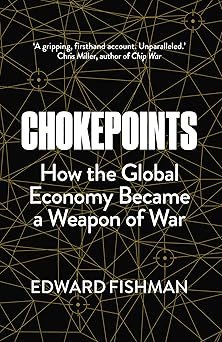Book Review: Chokepoints - How the Global Economy Became a Weapon of War
Summary
Delving into the history of how the US leverages control over ‘chokepoints’ in the global economic landscape this book provides a solid background for anyone interested in how ‘soft’ warfare is carried out with specific focus on the US. Given the ongoing tariff wars playing out between the US and the worlds other major players this is a timely read if you’re interested in understanding a bit more of the history of US sanctions albeit ones implemented in probably a slightly more ‘subtle’ way than sanctions by tweet are currently playing out.
The book goes through a number of sanction events placed on countries including Iran, China and Russia at different periods of time. Fishman has a former career as a diplomat which maybe gives him a somewhat unique lens on the topic and allows him to provide a relatively in depth and engaging commentary of the various sanctions applied by the US over recent decades.
We’re all aware that the global strategic power struggle plays itself out on more than just the kinetic ‘hot’ war stage and Chokepoints takes you under the hood of the various nonmilitary levers can be pulled to influence outcomes that are favourable to the country implementing them.
This is a timely read on a topic that has endured for several decades now yet due to the nature of current geopolitical events and especially the manner of communications taking place on various internet platforms is more front and centre of people’s minds.
At 350+ pages it may not be for everyone, and you can grasp the concept after a few of the examples have been covered to be honest however if you have the time, it’s still a worthwhile read. I listened to the audiobook which reduced the time commitment and is why it was more manageable so reading the physical copy may be more of a time commitment you may want to consider twice about making.
As the reader it leaves you with some ideas to ponder on how sanctions may be adopted in future as well as gaining a greater appreciation for the third and fourth order effects of the rise of globalisation over recent decades.
Chris Miller, the author of Chip War is referenced in the advertising material and for those who have read or are familiar with Chip War, if you enjoyed that you’re likely to enjoy this too. If you found Chip War to be more in depth than you feel is relevant for you then it’s likely, you’ll leave this feeling the same way or fail to finish it.
Who’s it for?
If you have a passing curiosity in global macroeconomics or geopolitics, then this will be a book for you. For those interested in investing and how actions by powerful natures can play out on the global stage with knock on effects to financial markets it’s also worth a read. If you’re just looking for an easy read, then this one probably isn’t for you though.

